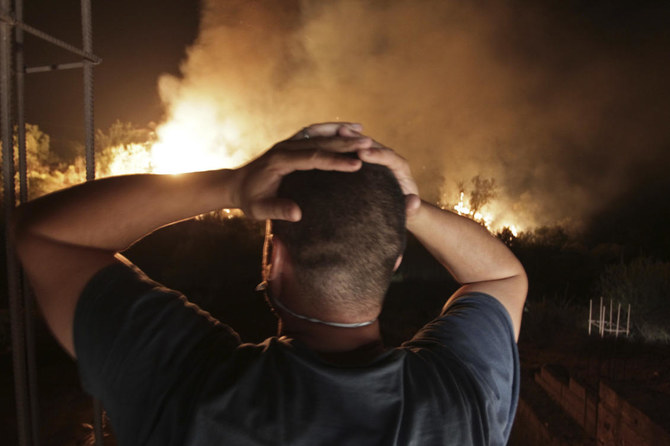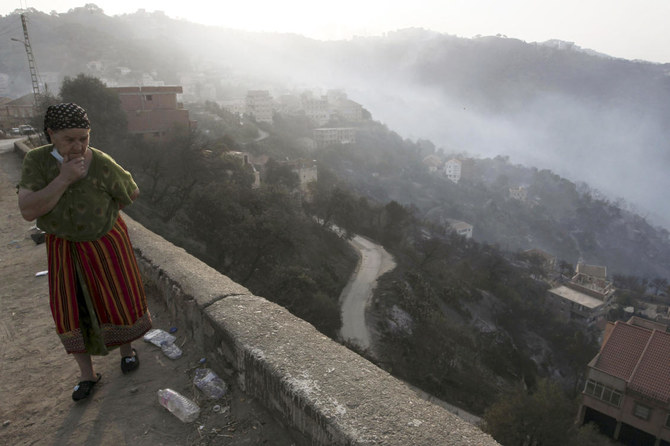ALGIERS/TIZI OUZOU: Firefighters, troops and civilian volunteers battled blazes in forests across northern Algeria on Wednesday as the country reeled at a death toll of at least 65 people in the latest wildfires to hit the Mediterranean.
Soldiers deployed to back the overstretched emergency services tackle the rash of more than 50 fires that broke out on Tuesday accounted for 28 of those killed, state television reported.
French President Emmanuel Macron said Paris would send two water bombers to the Kabyle region, promising on Twitter to support the country combat the violent fires.
“To the Algerian people, I want to give our full support (and) as of tomorrow, two Canadair aircraft and a command plane will be deployed in Kabyle,” he said. There are no such planes in the rugged area yet.
He also offered “unreserved solidarity” with the Algerian people in “facing this tragedy.”
Foreign Minister Jean-Yves Le Drian expressed France’s solidarity with the Algerian people.
“Our hearts go out to all the victims and their loved ones,” he said on Twitter, adding: “France stands ready to lend its support to deal with this situation.”
Benoit Payan, the mayor of Marseille city, where a large number of the Algerian-French nationals reside, also offered to send a team of firefighters and equipment to Kabyle, “if Algeria requests it.”
Algeria’s government later said it had reached an agreement with the European Union to hire two firefighting planes. The prime minister’s office said the planes, which will be in action from Thursday, had been used to tackle blazes in Greece.
Morocco’s King Mohammed VI expressed readiness to dispatch two aircraft and was waiting for approval from Algerian authorities to go ahead, Morocco’s state news agency MAP said.
The authorities say they suspect widespread arson after so many fires erupted in such a short space of time. They have announced several arrests but have yet to elaborate on the identity or suspected motives of those detained.
Images of trapped villagers, terrified livestock and forested hillsides reduced to blackened stumps were shared on social media, many of them accompanied by pleas for help.
AFP journalists saw villagers desperately trying to put out the spreading fires with makeshift brooms in an effort to save their homes.
High winds fueled the rapid spread of the fires in the tinder-dry conditions created by a heat wave across North Africa and the wider Mediterranean, fire official Youcef Ould Mohamed told the state-run APS news agency.
A total of 69 separate wildfires remained active Wednesday, spread across 17 provinces, emergency services spokesman Nassim Barnaoui told reporters.
Most of the fires and 16 of the deaths were recorded in Tizi Ouzou district, in the mainly Berber region of Kabyle, east of the capital Algiers.
“I left all my stock in my village and fled to Tizi Ouzou with my wife and three children,” said Abdelhamid Boudraren, a shopkeeper from the village of Beni Yeni.
“Luckily I own a flat in the center of Tizi Ouzou where I’m holed up with my family and some neighbors.”
There have been mounting calls for aid convoys to be sent to the worst-hit districts with food and medicine from the capital.
On Wednesday, an AFP correspondent saw several lorries headed to Tizi Ouzou with aid donated by the public.
An appeal for volunteer doctors to assist the city’s overstretched medical services also appeared on Facebook.
State media have reported four arrests for suspected arson.
Meteorologists expect the heat wave across North Africa to continue until the end of the week, with temperatures in Algeria reaching 46 degrees Celsius (115 degrees Fahrenheit).
In neighboring Tunisia, the capital Tunis hit an all-time record of 49 degrees Celsius (120 degrees Fahrenheit) on Tuesday.
The Tunisian emergency services reported 15 fires across the north and northwest, but no casualties.
On the northern shores of the Mediterranean, Turkey reported eight deaths and Greece three from wildfires that have raged for the past two weeks.
Each summer, Algeria endures seasonal wildfires but rarely with anything approaching this year’s toll.
In 2020, nearly 440 square kilometers (170 square miles) of forest were destroyed by fire, and several people were arrested on suspicion of arson.
On Monday, the UN released a major report showing how the threat from global warming is even more acute than previously thought.
It highlighted how scientists are quantifying the extent to which human-induced warming increases the intensity and/or likelihood of a specific extreme weather event, such as a heatwave or a wildfire.
Climate change amplifies droughts, creating ideal conditions for wildfires to spread out of control and inflict unprecedented material and environmental damage.
(With AFP and Reuters)
Algeria mourns 65 dead as Mediterranean wildfires spread
https://arab.news/v4cnu
Algeria mourns 65 dead as Mediterranean wildfires spread

- A total of 69 separate wildfires remained active Wednesday, spread across 17 provinces
- France, EU and Morocco to dispatch aircraft to help Algeria tackle the blazes
Indonesia ‘strongly rejects’ Trump’s Gaza plan

Jakarta also called on the international community to respect international law
JAKARTA: Indonesia “strongly rejects” the proposal made by President Donald Trump for the United States to assume control of Gaza and resettle Palestinians elsewhere, the Foreign Ministry said Wednesday.
Trump announced the stunning proposal Tuesday, without detailing his plans on how to move out nearly two million Palestinians from the enclave, claiming that the US will rebuild the territory and turn it into the “the Riviera of the Middle East.”
Indonesia, the world’s most populous Muslim nation, has consistently called for a two-state solution to the Israeli-Palestinian conflict.
“Indonesia strongly rejects any attempt to forcibly displace Palestinians or alter the demographic composition of the Occupied Palestinian Territory,” the Foreign Ministry said in a statement posted on social media X, formerly Twitter.
Jakarta also called on the international community to respect international law, “particularly the right to self-determination of the Palestinians as well as their inalienable right to return to their homeland,” the ministry added.
Trump claimed there was support from the “highest leadership” in the Middle East and upped pressure on Egypt and Jordan to take displaced Palestinians — despite both countries flatly rejecting the idea.
Jakarta said addressing the “root cause” of the conflict, namely “the illegal and prolonged Israeli occupation of the Palestinian territory,” was the only path to achieve a lasting peace in the region, the statement added.
Kuwaiti emir appoints new defense minister

- Sheikh Abdullah Ali Abdullah Al-Salem Al-Sabah took the oath as minister of defense
LONDON: Emir of Kuwait Sheikh Meshaal Al-Ahmad Al-Jaber Al-Sabah appointed a new defense minister to succeed Sheikh Fahad Youssef Saud Al-Sabah.
During the swearing-in ceremony at Bayan Palace on Tuesday, Sheikh Abdullah Ali Abdullah Al-Salem Al-Sabah took the oath as minister of defense.
Sheikh Fahad has assumed the position of first deputy prime minister and minister of interior following an emiri decree, according to the Kuwait News Agency.
Crown Prince Sheikh Sabah Khaled Al-Hamad Al-Sabah and other senior Kuwaiti officials attended the ceremony.
Deportation from occupied territory ‘strictly prohibited’: UN on Gaza

- “The right to self-determination is a fundamental principle of international law and must be protected by all states,” Turk said
GENEVA: UN rights chief Volker Turk insisted Wednesday that deporting people from occupied territory was strictly prohibited, after US President Donald Trump’s shock proposal for the United States to take over Gaza and resettle its people.
“The right to self-determination is a fundamental principle of international law and must be protected by all states, as the International Court of Justice recently underlined afresh. Any forcible transfer in or deportation of people from occupied territory is strictly prohibited,” Turk said in a statement.
Iraq restoration work brought back Mosul’s ‘identity’: UNESCO chief

- The director-general of United Nations heritage body UNESCO hailed the completion of their restoration work in the Iraqi city of Mosul, saying on Wednesday it had allowed it to recover its “identity”
MOSUL: The director-general of United Nations heritage body UNESCO hailed the completion of their restoration work in the Iraqi city of Mosul, saying on Wednesday it had allowed it to recover its “identity” after destruction inflicted by the Daesh group.
Mosul’s historic Al-Nuri Mosque with its famed leaning minaret, nicknamed Al-Hadba or “hunchback,” has been restored using its original brickwork, years after it was reduced to rubble under Daesh group rule.
“I am very happy to stand before you and before the minaret over 850 years old... and the fact to have it here behind me in front of you is like history coming back... is like the identity of the city coming back,” Audrey Azoulay said.
The mosque and minaret were destroyed in June 2017 during the battle to oust IS from Mosul, and Iraq’s authorities accused the jihadists of planting explosives before their withdrawal.
They are the latest landmarks in Mosul to be restored by UNESCO, whose teams have worked for five years to revive several sites.
“The reconstruction of this minaret needed to reuse nearly 45,000 original bricks,” the UNESCO chief said, adding that traditional techniques were used to rebuild the iconic structure.
Azouley said residents had wanted the rebuilt minaret to resemble the original. “The people of Mosul wanted it tilted,” she said.
Eighty percent of Mosul’s old city was destroyed in the fight against IS.
UNESCO restoration project also include Al-Tahira and Our Lady of the Hour churches and 124 heritage houses.
Prime Minister Mohammed Shia Al-Sudani will inaugurate the restored landmarks in the coming weeks.
Egypt wants Palestinian Authority to ‘assume its duties’ in Gaza: FM

CAIRO: Egypt’s Foreign Minister Badr Abdelatty called on Wednesday for the Palestinian Authority to govern the Gaza Strip, hours after President Donald Trump announced a proposal for the United States to take over the territory.
In a meeting with Palestinian Prime Minister Mohammed Mustafa, Abdelatty said Egypt was eager for the Palestinian Authority to “assume its duties in the Gaza Strip as part of the occupied Palestinian territories,” according to a foreign ministry statement.
Abdelatty called for swift reconstruction of Gaza without the displacement of Palestinians from the territory after Trump’s proposal to take it over.
The two men agreed on “the importance of moving forward with early recovery projects... at an accelerated pace... without the Palestinians leaving the Gaza Strip, especially with their commitment to their land and refusal to leave it,” the Egyptian foreign ministry said.






















